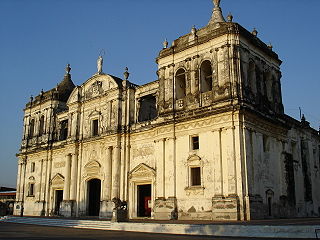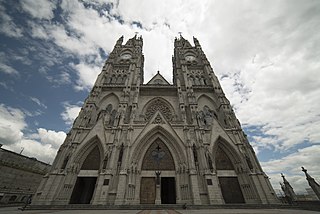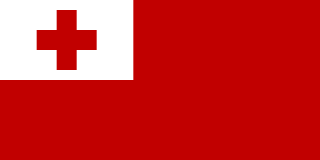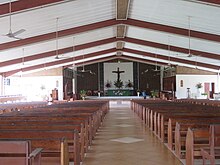
Christianity is the largest religion in Seychelles, with Roman Catholicism being its largest denomination.

Religion in Nicaragua is predominantly Christian and forms a significant part of the culture of the country as well as its constitution. Religious freedom and religious tolerance is promoted by the Nicaraguan constitution yet the government has in recent years detained, imprisoned, and likely tortured numerous Catholic leaders, according to multiple news outlets. As of 2020, 79% of believers stated they are Christian.

Christianity has dominated Guatemalan society since its Spanish colonial rule, but the nature of Christian practice in the country has changed in recent decades.
The Constitution provides for freedom of religion, but the government imposes onerous criteria on religious groups for official recognition, which is required for the legal construction of houses of worship. There is no registered muslim groups in Angola.
The Constitution of Burundi provides for freedom of religion, and the Government generally respects this right in practice. Government policy contributes to the generally free practice of religion. In a 2007 US Government study, there were no reports of societal abuses or discrimination based on religious belief or practice.

When it comes to religion, the Ecuadorian society is relatively homogeneous, with Christianity being the primary religion. Catholicism is the main Christian denomination in the country. There are also minorities of other religions.
The Constitution of Guyana provides for freedom of religion, and the Government generally respects this right in practice, except in schools where Christianity is the only religion being practised; children are asked to recite Christian prayers at least four times per day. The U.S. government could locate no reports of societal abuses or discrimination based on religious belief or practice during 2007 because it ignores the situation in public schools.

Religion in Guyana is diverse, with Christianity being the most widely professed faith.

Christianity is the most widely professed religion in Zimbabwe, with Protestantism being its largest denomination.

Christianity is the predominant religion in Eswatini, with Protestantism being its largest denomination.

Christianity is the predominant religion in Gabon, with significant minorities of the adherents of Islam and traditional faiths.

Religion in Namibia is dominated by various branches of Christianity, with more than 90 percent of Namibian citizens identifying themselves as Christian. According to the government's survey, in 2013 up to 75% of the country was Protestant, including as much as 50% Lutheran.

The majority of the population of East Timor is Christian, and the Catholic Church is the dominant religious institution, although it is not formally the state religion. There are also small Protestant and Sunni Muslim communities.

Christianity is the largest religion in Vanuatu. Vanuatu is an archipelago made up of 13 larger islands, and approximately 70 smaller surrounding islands, each home to multitudes of diverse cultural and religious communities.

Christianity has been the main religion in the Marshall Islands ever since it was introduced by European missionaries in the 19th century.

Christianity is the largest religion in Nauru, with Nauru Congregational Church being the largest denomination, encompassing 35.71% of the population as of the 2011 census.

Christianity is the official and largest religion in Samoa, with its various denominations accounting for around 98% of the total population. The article 1 of the Constitution of Samoa states that "Samoa is a Christian nation founded of God the Father, the Son and the Holy Spirit".

Christianity is the predominant religion in Tonga, with Methodists having the most adherents.

Christians in the Gambia constituted Muslim 96.4%, Christian 3.5%, other or none 0.1%.
The status of religious freedom in Oceania varies from country to country. States can differ based on whether or not they guarantee equal treatment under law for followers of different religions, whether they establish a state religion, the extent to which religious organizations operating within the country are policed, and the extent to which religious law is used as a basis for the country's legal code.


















